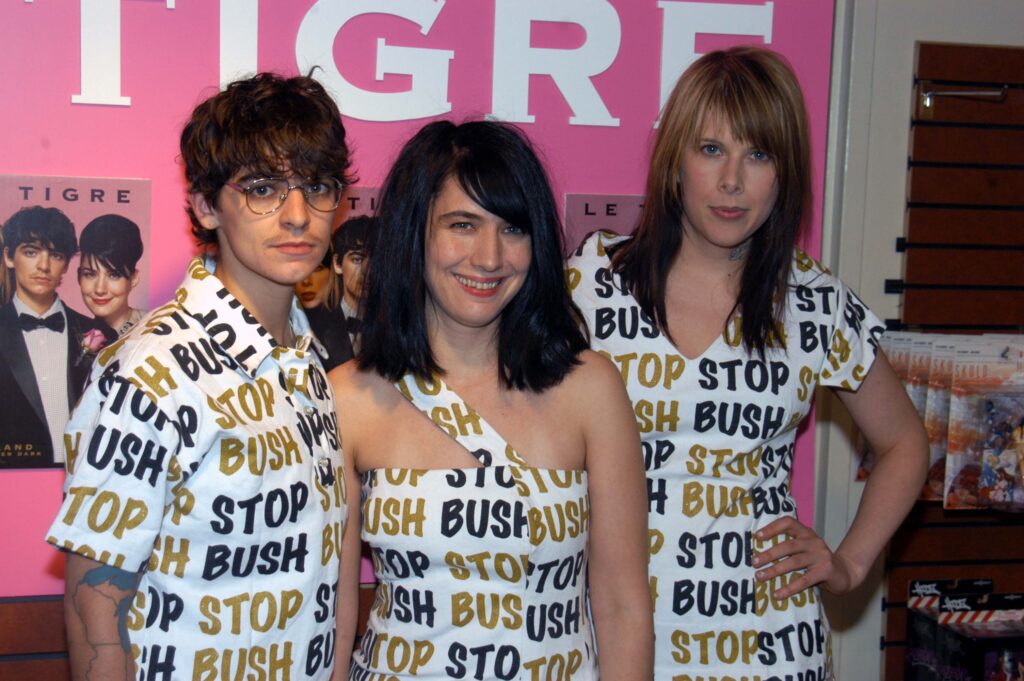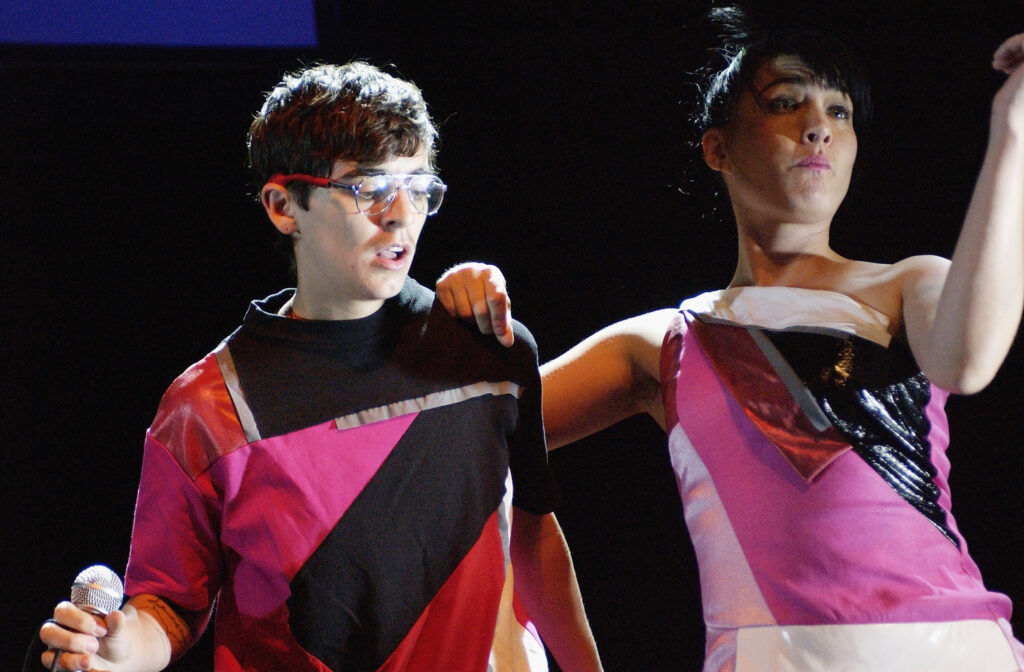A new generation has discovered the infinitely danceable punk and electro-pop of Le Tigre and their songs of pride and protest. More than a decade after the trio went on indefinite hiatus, teenage TikTokers have begun attaching clips of frustration and hope to the thumping basslines and Casio keyboard hooks of 1999’s “Deceptacon,” as singer Kathleen Hanna wails “Wanna see me disco?/Let me hear you depoliticize my rhyme!”
For their first seven years as a band, Le Tigre was the most ferocious and infectious dance party around, singing of feminist and queer identity with riot grrrl chants and a raw pop sensibility. In 2005, the band of Bikini Kill frontwoman Hanna and singer-musicians Johanna Fateman and JD Samson went into hibernation after three albums. But this weekend, Le Tigre reunits onstage in Pasadena, California for the two-day This Ain’t No Picnic festival.
The timing seems right for a return of their bouncy musical activism, as the U.S. Supreme Court dismantles reproductive rights and threatens the future of gay marriage in America. Meanwhile, elementary school faculty in Florida schools are barred from even uttering the word “gay.”
There have been a handful of brief reunions throughout the years, including a Yoko Ono cover in 2007, a 2015 Pussy Riot collaboration, and 2016 single “I’m With Her,” released in support of Hillary Clinton’s campaign for president. Fateman’s 13-year-old daughter has now kept them in the loop on the TikTok generation, as young fans embrace “Phanta” and other anxious Le Tigre tunes.
They’ve been contemplating this weekend’s show since 2020 (but were delayed by COVID-19) and now have been working to reignite a song catalog that remains as relevant in 2022 as during the last Bush administration. While Hanna was overseas performing with Bikini Kill, Fateman and Samson talked to SPIN about getting the band back together, the songs that matter now more than ever, and the possible future of Le Tigre.

SPIN: Your shows before the hiatus were being exceptionally fun and exciting, but also meaningful. Do you feel like you’ve tapped back into that same energy again?
Johanna Fateman: We’ve been practicing pretty intensely for six days a week. In some ways, it feels like no time has passed at all. We’re reconnecting as friends and bandmates and finding that dynamic again, and we’re also letting the lyrics and our original ideas resonate with the present. Personally, I find it really meaningful to get back together in this moment. I hope the audience feels that way too, but for us, it’s really clicking.
Why is the reunion happening now?
JD Samson: We were asked to reunite for this festival in 2020, and we felt that it was really important for us to reunite prior to the 2020 election. We felt the relevance of our music would really stir up something important within our community. And obviously that was canceled because of COVID. We just continued to want to present the material again.
Fateman: We went in really different directions after we stopped playing shows in 2005. JD has become a professor. I’m an art critic. Kathleen has done various nonprofit work, and then she did the Julie Ruin and then Bikini Kill reunited. We had more than a decade to just be individuals again, and then come back together, bringing more to the project.
You did get together now and then to do things like that song “Don’t Cry Genocide” with Pussy Riot for House of Cards in 2015. So it wasn’t like you weren’t speaking.
Fateman: JD and I collaborated on songwriting things. There was never bad blood between us. We love each other. But Le Tigre is sort of a funny organism. For us, it’s as much art and political activism as it is music. It thrives under the right conditions.
On the 2004 tour, you managed to mix a very festive atmosphere with images of George W. Bush during “Seconds” and generally dealt with serious issues while dancing.
Samson: I think that there’s a radical potential for any kind of joy that comes out of dance. For many years, I think the three of us were seen as angry feminists. And it was really important for us to fuse the two and enjoy dancing and being festive while being smart at the same time and critical. That was something that a lot of people enjoyed about our shows. Some people came because they were interested in the politics and they learned to love the music, and some people loved the music and learned a lot about the politics.
This weekend, you will be facing a festival crowd at This Ain’t No Picnic, and a lot of people there will have never seen you before. Is that an exciting challenge?
Fateman: We’ve thought a lot about that. We’ve created new videos that play with our songs. And one thing that we thought about was both in terms of accessibility for people who can’t hear, and for accessibility to people who might not know our music or know what we’re about. We are going to have the lyrics incorporated into the visual presentation of the show. We’re doing some exciting visual things that scale up really well. But for us, we’re a punk band and we’re most comfortable in that kind of cozy sweaty cramped environment. So we just try to create that with each other on stage.
A lot has happened in the last decade, including gay marriage being legalized across the country, but also Roe vs. Wade being dismantled at the Supreme Court. How does that fuel what you will be up to?
Fateman: We have this song called “FYR,” which stands for “Fifty Years of Ridicule.” And one of the lyrics is “One step forward, five steps back.” That’s how we’ve always felt in our sad moments about progressive struggles – you gain one thing and then you’re totally blindsided by another development. And certainly we feel pretty upset about the composition of the Supreme Court and not just Roe vs. Wade, but a number of things that are coming down the pipeline, including gay marriage being under threat now.
Samson: What’s interesting about this set is that we don’t have to say much about what’s happening now. We can let the old words speak for themselves, with the relevance of what they mean today. Us saying “votes suppressed in blue zip codes” or whatever – it’s happening again, 17 years later, 20 years later. We don’t have to give all the information about how it’s still relevant. That’s obvious.
Fateman: The audience can connect the dots and bring it into the present. And actually JD, you mentioned the one lyric that we changed in “FYR.” We used to sing, “We’ll rock the fuckin’ vote with election fraud in poor zip codes.” When I was compiling the lyrics for the new video material, I was like, I really don’t want to say “election fraud” because that’s sort of a dog whistle for the Right now. And in 2000 and whenever we wrote that, it just had a totally different meaning. So we changed that. We don’t want there to be even a moment where we’re tapping into Trumpist rhetoric accidentally, you know?
[embedded content][embedded content]
It’s striking that, even as some things progress, something as overt as the “Don’t say gay” law in Florida can happen. As some things improve, the opposite energy gets emboldened in some strange way.
Fateman: The culture war stuff that we’re seeing right now feels very familiar, even though I think you’re right. The “Don’t say gay” bill, even from like an ’80s/’90s perspective that felt kind of crazy. That’s really like Jesse Helms at his most jacked. But I actually don’t feel like it’s five steps back. I feel a little more hope. I was reading today about these huge numbers of women between the ages of 18 and 25 registering to vote in the immediate wake of Roe vs. Wade being overturned. And I’ve seen the young people of Florida – high school students – really coming out against that kind of suppression of their speech. I do feel like Gen-Z is going to save us.
Samson: And they’re gonna be at our show.
In the years, since you were the most active, have you seen an impact that Le Tigre has had in a new generation of musicians or artists?
Samson: I teach in a music program at NYU, and for a lot of my students, I feel like they know who Le Tigre is, and they know about our politics. I think they really respect our conceptual understanding of what a band is and how to make it more artful. But also the numbers on TikTok have been really interesting for us to see. And Johanna has a daughter who keeps us up to date on that. [Laughs.]
Fateman: The fact that “riot grrrl” – in quotation marks – is now an enduring genre of music is really interesting, because for me and my peer group, we thought it was a moment in time. Nothing’s permanent, but now it’s a more long-lasting part of culture that’s almost part of many young people’s coming of age story – where they discover this queer/feminist music and it’s part of their intellectual, social, spiritual, sexual development. I think that’s really moving. I’m really floored by that.
I find the videos on TikTok. I’m just endlessly fascinated by how creative people are, and I love how they use our music. “Decepticon” is like an indie classic or whatever, and I just love seeing how it reverberates for people in different times in different parts of the world, and how they use it to construct their identity online.
Samson: Another song of ours that’s really popular on TikTok is “Phanta” and we’re going to play that for the first time ever.
In the time since your last shows together, you’ve all been doing other things. Was it easy getting back into that state of mind?
Samson: I’ve been performing since Le Tigre stopped in other bands. I went on tour with Peaches for a year and then I had this band MEN for a long time. Now I have a band called Crickets [including keyboardist Roddy Bottum] that’s mostly just fun times. Being on the stage doesn’t feel different, but being on the stage with Jo and Kathleen is a whole different can of worms. In some ways I feel like it’s just another day. And in other ways I feel like it’s something I have to really get ready for and put on those old shoes I used to wear.

What is it about working with Kathleen that is the third piece of what you do?
Fateman: Le Tigre kind of started out of a really close friendship that I had with Kathleen from the mid-90s on the west coast. I have been in dialogue with her as a friend and also creatively since I was a teenager, so I don’t know that I can have any perspective on that. Le Tigre is the three of us. And it’s not Le Tigre with one of us not here. But Kathleen has such charisma and magnetism as a singer, and is able to channel really intense emotion and really sophisticated creative ideas into songs and moments and feelings.
Samson: She also is really talented at getting the audience to trust her and trust us as a band. When she has a mic people listen, and it’s a quality that makes our band what it is.
For the entire time that Le Tigre was active before, Bikini Kill wasn’t around. Now she’s doing both. Does that bring anything different to the band?
Fateman: I don’t think so, because we’re actually all sort of taking a little break from our normal lives to do this show. [Laughs.] We don’t have any firm decisive plans to tour after this. It’s kind of a funny detour for us individually. Just yesterday I filed my art reviews and we’re still very much in our separate lives, even as we’re getting together to do this and we’ll see how it goes. If we’re going to do more shows, if we’re up for touring, it’s all up in the air and anything could happen.
Samson: Interestingly enough, I think all of our other jobs really just make us sharper in what we do for this band. Kathleen’s really warmed up vocally. [Laughs.]
Fateman: She’s so strong from touring. It’s awesome!
Are any songs coming together in rehearsal with a new life that you find interesting or exciting?
Samson: I think they all have a new life because they’re being played at a different time. Yesterday I was singing “Keep On Livin’” and I started to tear up because I had this memory of what it felt like to sing that to a crowd of people. Thinking about the way things have changed made me cry tears of joy in a way. People have a different way out now. Teenagers can find other people like them really easily. That one for me has brought a new emotion to the picture.
Fateman: “My My Metrocard” is one that sticks out to me. It’s one scratchy lo-fi sample played through the whole song, and I remember just being like, wow, we’re really getting away with this? Now I’m just, this is really cool. It’s almost hypnotic for me and the fact that we yell “Oh fuck Giuliani,” I’m like, wow, we’re still talking about Giuliani! And I have a whole new depth of feelings and thoughts about Rudy Giuliani. So I’ve had fun with being in the time machine and just being like, okay, these things that I thought we were progressing past, I’m now back in and really owning it as something really cool that we did that still feels real and punk. We were really unafraid. And that will be one of my lifelong lessons from this band: Just do it, you know? Not in the Nike way. [Laughs.]

You’re obviously putting a lot of effort into this reunion. Can you really put all that into motion and just have it be one show?
Samson: We don’t have anything in stone, but I think we’re open to the possibilities for sure.
Fateman: There’s a lot of factors, obviously. Like it’s not a great time to tour because of COVID and obviously Bikini Kill has had to cancel a huge number of shows because of band and crew getting sick. I don’t think we’re going to count our chickens before they hatch. Is that the phrase we should use? [Laughs.] But we’re excited, so we’re open to it.

Leave a comment